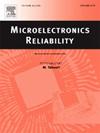利用深层次瞬态光谱分析用湍流重离子辐照的 n 型 4H-SiC 肖特基势垒二极管中缺陷的演变过程
IF 1.6
4区 工程技术
Q3 ENGINEERING, ELECTRICAL & ELECTRONIC
引用次数: 0
摘要
通过深电平瞬态光谱(DLTS)研究了室温下用 9.5 MeV/u 209Bi 离子辐照的 n 型 4H-SiC 肖特基势垒二极管(SBD)中深电平的演变。从 40 K 到 800 K 的 DLTS 扫描显示,在导带边缘 (EC) 以下 0.12 到 1.6 eV 的能量范围内存在 EN1、EHTi(h) (EC-0.13(1) eV)、EH1(EC-0.48(2) eV)、EH4 (EC-0.97(3)eV) 和 EH6/7 (EC-1.60(1) eV) 缺陷水平。辐照前后 4H-SiC SBD 样品的 DLTS 结果清楚地表明,湍流重离子(SHI)辐照诱导了 4H-SiC SBD 器件中深层缺陷或缺陷态的演化。值得注意的是,在 1 × 1011 离子/cm2 的通量下,离子诱导的深层次缺陷或缺陷态由于热量的累积效应而表现出明显的恢复,从而导致碳化硅再结晶。本文章由计算机程序翻译,如有差异,请以英文原文为准。
The evolution of defects in n-type 4H-SiC Schottky barrier diode irradiated with swift heavy ion using the Deep Level Transient Spectroscopy
The evolution of deep levels in n-type 4H-SiC Schottky barrier diodes (SBDs) irradiated with 9.5 MeV/u 209Bi ions at room temperature was investigated by Deep Level Transient Spectroscopy (DLTS). DLTS scans from 40 K to 800 K indicated the presence of EN1, EHTi(h) (EC-0.13(1) eV), EH1(EC-0.48(2) eV), EH4 (EC-0.97(3)eV), and EH6/7 (EC-1.60(1) eV) defects levels within the energy range from 0.12 to 1.6 eV below the conduction band edge (EC). The DLTS results for the 4H-SiC SBD samples before and after irradiation clearly demonstrated that swift heavy ion (SHI) irradiation induced the evolution of deep level defects or defect states in 4H-SiC SBD device. Notably, at a fluence of 1 × 1011 ions/cm2, the ion-induced deep level defects or defect states exhibited significant recovery due to the cumulative effect of heat, leading to SiC re-crystallization.
求助全文
通过发布文献求助,成功后即可免费获取论文全文。
去求助
来源期刊

Microelectronics Reliability
工程技术-工程:电子与电气
CiteScore
3.30
自引率
12.50%
发文量
342
审稿时长
68 days
期刊介绍:
Microelectronics Reliability, is dedicated to disseminating the latest research results and related information on the reliability of microelectronic devices, circuits and systems, from materials, process and manufacturing, to design, testing and operation. The coverage of the journal includes the following topics: measurement, understanding and analysis; evaluation and prediction; modelling and simulation; methodologies and mitigation. Papers which combine reliability with other important areas of microelectronics engineering, such as design, fabrication, integration, testing, and field operation will also be welcome, and practical papers reporting case studies in the field and specific application domains are particularly encouraged.
Most accepted papers will be published as Research Papers, describing significant advances and completed work. Papers reviewing important developing topics of general interest may be accepted for publication as Review Papers. Urgent communications of a more preliminary nature and short reports on completed practical work of current interest may be considered for publication as Research Notes. All contributions are subject to peer review by leading experts in the field.
 求助内容:
求助内容: 应助结果提醒方式:
应助结果提醒方式:


